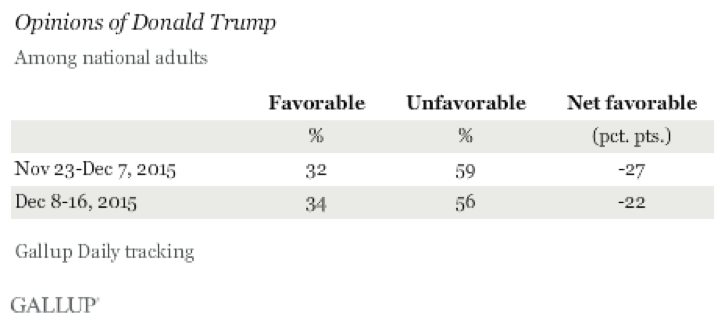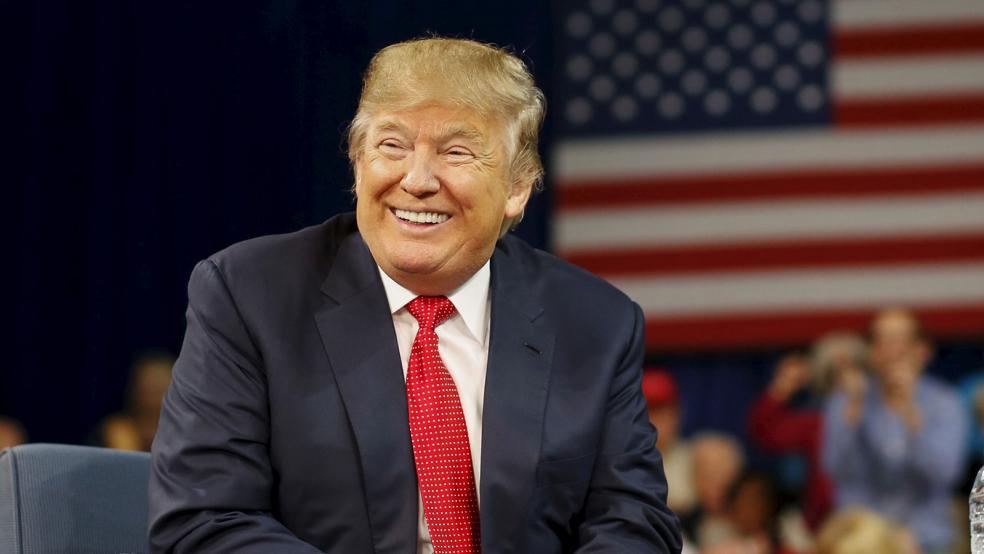It’s been another good day at the office for GOP presidential frontrunner Donald Trump.
He won a seal of approval from Russian President Vladimir Putin, who told reporters in Moscow Thursday that the bellicose businessman is the “absolute leader in the presidential race” and a “very lively man, talented without doubt.”
The latest Boston Herald/Franklin Pierce University poll shows Trump still leading in New Hampshire with 26 percent of the likely GOP primary vote, with Senators Ted Cruz and Marco Rubio and New Jersey Gov. Chris Christie clustered behind him.
Related: Putin Would ‘Welcome’ a Donald Trump Presidency
And despite more than a week of uproar over Trump’s controversial call for barring all Muslims from the U.S. until authorities get a better handle on the threat of terrorist attacks, his national approval rating has inched up, with Democrats seemingly warming to him even while Republicans cool a little bit.
That last development is the most surprising and suggests that even as GOP establishment leaders are having conniptions over Trump’s commanding lead in a crowded Republican field, Trump is the ultimate Teflon candidate virtually immune to controversy and attacks by his rivals.
A new Gallup poll shows that Trump’s image among all Americans has trended up, not down, after he touched off an international uproar with his comments Dec. 7 proposing to bar all Muslims other than U.S. citizens from entering the country.
Former Florida governor Jeb Bush declared that the xenophobic Trump had come “unhinged,” while others said that Trump had sullied the reputation of the U.S. and harmed its relations with Middle Eastern countries vital in the war against ISIS and international terrorist activities.
Frank Newport, Gallup’s editor-in-chief, wrote on Friday that “we can reject [the] hypothesis” that Trump took a serious hit as a result of his comments. And while Trump had a serious negative image compared to other GOP candidates before the controversy, his overall negative rating “became slightly less so after his pronouncement, rather than more so.”
Related: Brits Sign Petition to Ban Trump, Who Cameron Calls ‘Divisive and Stupid’
The numbers should be fair warning to his closest rivals in the Republican primary contest and Hillary Clinton that Trump’s voter appeal may be broader than many assume.
During the two weeks leading up to Trump’s call for blocking Muslims’ entry to the U.S., Trump had a net favorable score among all adult Americans of negative 27 points. (That is based on a favorable rating of 32 percent and an unfavorable rating of 59 percent; taken together, it’s a negative 27.)
But rather than his favorability rating dipping even more amid negative comments from leaders of both parties and the news media, Trump’s rating improved slightly to a net minus 22 points, with 34 percent of Americans favorably inclined and 56 percent unfavorable.

The dust-up over immigration and national security policy hasn’t hurt Trump for the most part, either in subsequent polls or in last Tuesday night’s GOP presidential debates, when Bush and Sen. Lindsey Graham of South Carolina were just about the only ones to directly chastise Trump for his comments.
Among Republicans and GOP-leaning independents, support for Trump does appear to have taken a slight hit, which suggests that some within the party were troubled by his intemperate remarks. But Democrats actually appear slightly more positive about the GOP frontrunner.
Related: Rubio Outshines Trump, Cruz in GOP Foreign Policy Debate
Trump’s net favorability rating among Republicans and GOP-leaning independents edged down by seven percentage, according to Gallup. At the same time his net favorable rating rose by 10 points among Democrats and Democratic-leaning independents.
In the poll, Gallup interviewed 1,927 people Nov. 23 through Dec. 7 and 1,250 adults Dec. 8 through 16.
The sample sizes are smaller when you drill down into the preferences of the Republicans and Democrats, so Gallup can’t be completely certain of its findings.
“It’s not clear to me why the Muslim ban controversy would make Democrats more positive about Trump than before, while making his image less positive among Republicans,” Newport wrote. “These are all small changes, I should underscore, and it is going to take a while before we know if there is a lasting impact. Still, at this juncture, we can say that Trump has not helped himself with Republicans – presumably his more immediate objective since he has to win the GOP nomination before he can run in the general election.”





